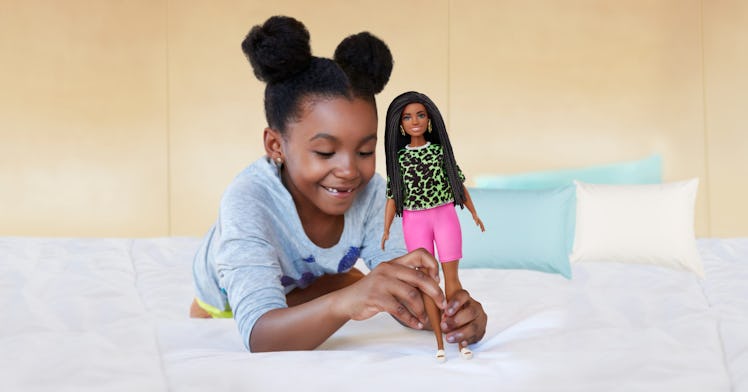Want Your Kids To Develop Social Skills? Get Them A Doll
A new study shows dolls allow kids to practice social skills, even when they play alone.

This post was written in partnership with Barbie®
Psychologists and parents have theorized for a long time that pretend play is good for developing brains, but there hasn’t yet been a lot of neurological evidence specific to this theory. A quartet of British researchers sought to help fill in this blank with a new study in Frontiers in Human Neuroscience on the neurological effects of doll play.
The experiment, a collaboration between Barbie® and neuroscientists at Cardiff University, studied 42 four- to eight-year-old children freely playing with either dolls (an assortment of Barbie dolls and playsets) or a tablet loaded with open-ended video games, with either a social partner or by themselves. The study used near-infrared spectroscopy equipment that measured the activity in the prefrontal and posterior superior temporal sulcus, or pSTS, of each subject.
The pSTS is a region of the brain that is associated with social interactions and social processing in fMRI imaging studies in adults. It’s not surprising, then, that this region was activated when kids in the study played with a social partner no matter which toy they played with.
The finding of the study that’s most interesting — and most relevant to parents — is that for kids playing alone, the pSTS was more engaged during doll play than tablet play. Here’s why the authors found that so significant:
These findings…highlight how doll play can achieve similar patterns of activation, even when children play by themselves. Doll play may provide a unique opportunity for children to practice social interactions important for developing social-emotional skills, such as empathy.
The results of the study suggest that pretend play allows kids to practice social interactions even when they’re alone, a situation that’s become more common in the era of stay-at-home orders and remote learning.
The benefits of social doll play have long been well known: Playing with dolls is a creative activity that helps kids practice how to interact with other people while allowing them to make mistakes. It’s also important that children be able to identify with dolls so that they can imagine the world from others’ perspectives and build empathy.
But in times of social distancing or even just when a playdate isn’t possible, it’s good to know that giving your kids a doll instead of a tablet could help them practice their social skills, making them more empathetic and well-adjusted than they might otherwise be. Learning skills like empathy is also an important indicator of future success, helping kids be better collaborators and leaders. So if you’ve been nervous about the hours of extra tablet time your kid has been getting, replace that time with Barbie doll play to help build these important skills.
“Exploring the Benefits of Doll Play Through Neuroscience” was commissioned by Barbie (2020). Study was conducted with 42 children (20 boys and 22 girls) ages 4-8 years old with full data captured from 33 children.